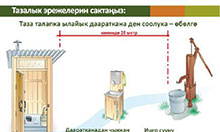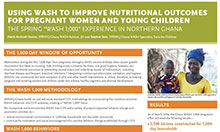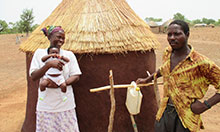Community Achieves Open Defecation-Free Status with Help from Neighboring Community
In rural Kpatia-Tengre, a 131-member community in the Talensi District of the Upper East Region of Ghana, a lack of latrines resulted in community members openly defecating around homes and in fields that are used for agriculture. But when members of the community joined members of the nearby Tualabare village to watch a video on improving water, sanitation, and hygiene (WASH) in the first 1,000 days between pregnancy and a child’s second birthday, they began their journey to achieving open defecation-free (ODF) status.
USAID’s multi-sectoral nutrition project— Strengthening Results, Partnerships, and Innovations in Nutrition Globally (SPRING)— implements a comprehensive approach to improving nutrition, addressing both the immediate and intermediate causes of malnutrition. For example, SPRING is using its WASH 1,000 approach to target households with pregnant and lactating women and children under two (1,000-day households) with interventions to address poor sanitation that can contribute to malnutrition. SPRING’s WASH 1,000 video is a one-hour drama that encourages 1,000-day households to adopt new behaviors, such as improved handwashing practices and safe disposal of feces in and around homes. The video drama shows the difference between a household that implements these practices and one that does not, warning against the health risks that come from open defecation and poor sanitation in the home.

After watching the community drama, we realized that the sanitation of our community had a lot to do with the cases of diarrhea [and] invasion of flies… We felt that there was a need to do something about it.
-Tengdo Kuzoba, resident of Kpatia-Tengre community

SPRING’s Four Key WASH Behaviors
- Washing hands with soap at the appropriate times for all caregivers
- Safely disposing of adult and child feces in a latrine
- Creating clean place spaces that separate children from environmental contaminants
- Disinfecting drinking water for children between the ages of six months to two years
After watching the video, Tengdo Kuzoba, Zang Nanyere, and Mbona Ngansah of Kpatia-Tengre began building latrines at home with support from friends in Tualabare who had been trained by Talensi Environmental Health Officers from the Ghana Health Service. The three neighbors constructed latrines with accompanying tippy taps (simple low-cost devices for handwashing) around their homes. This led to a revolution in the Kpatia-Tengre community, with all the other households constructing their own latrines.
“After watching the community drama, we realized that the sanitation of our community had a lot to do with the cases of diarrhea in our community,” Tengdo Kuzoba said. “We felt that there was a need to do something about it. This led us to adopt the practices that had been shown in the video and also educate our neighbors to adopt the same.”
As community members proceeded with latrine construction, District Environmental Health Officers who came to monitor progress at Tualabare observed the members of Kpatia-Tengre constructing their own latrines. The SPRING-trained government staff members were impressed by the community’s motivation and began providing guidance on how to improve sanitation across the whole community, through ODF verification and certification. In a few months, the community participated in its first verification, which it failed due to incomplete latrines in two households. The community mobilized and supported those households to finish their latrines, and invited the verification team to return. This time, they passed and were declared ODF. “The community has realized there is greater reward in communal labor,” said Zang Nanyere. “We have therefore agreed to mobilize and re-construct collapsed latrines. We have also put a GHS 5.00 ($1.5) fine on anyone caught practicing open defecation and have also resolved to carry out monthly clean up exercises.”
In SPRING-supported communities, over 6,700 latrines have been constructed by households using their own resources, leading to increased safe disposal of feces. As a result, more than 150 communities SPRING works with have been declared ODF.


